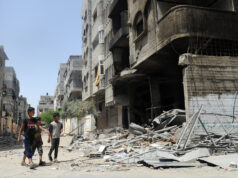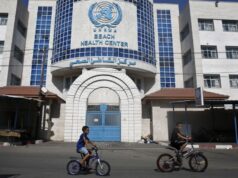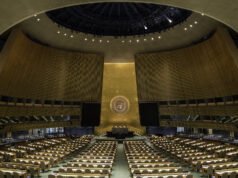France, the United States, and Britain attacked Libyan leader Muammar Qaddafi’s forces over the weekend in the first action to enforce a UN-mandated no-fly zone after pro-Qaddafi forces continued their assault on rebel strongholds despite declaring a ceasefire. Operation Odyssey Dawn, as the allied assault has been called, began when a French plane fired against Libyan government targets on Saturday, destroying a number of military vehicles advancing on the rebel town of Benghazi.
By Sunday, Washington confirmed that a no-fly zone encompassing about one third of Libya was in place. According to Pentagon officials, the U.S. and the UK have fired more than 110 missiles since the mission’s start, including two that demolished Qaddafi’s compound in downtown Tripoli.

The USS Barry launches a Tomahawk missile in support of Operation Odyssey Dawn on March 19, 2011. |
But what’s next for the U.S. and the coalition is unclear. Allied forces confirmed Monday that the Libyan leader is not a military target. Moreover, in announcing the attacks on Saturday, President Obama said he authorized a “limited military action in Libya,” emphasizing that the U.S. “is acting with a broad coalition” and “will not deploy any U.S. troops on the ground.” The following day, Defense Secretary Robert Gates confirmed Obama’s position, stating that the United States would not play a “preeminent role” and that Washington expects “to turn over the primary responsibility to others” in just days.
Obama and Gates’ words reinforce the fact that, throughout this ordeal with Libya, the White House has purposefully taken a back-seat in the international cause against Qaddafi. From drafting the UN resolution against Qaddafi to now actually attacking the dictator’s forces, there’s no doubt that France and Britain are the driving force behind the mission. But as leader of the free world, shouldn’t the United States be playing a larger role?
Additionally, as the mission stands – with no plans to oust Qaddafi – it is looking strikingly similar to the one employed by President George H.W. Bush in 1991 against Saddam Hussein. But, as during the First Gulf War, one has to wonder if an operation that fails to bring down Qaddafi will only set the stage for harder times later, as the United States and her allies faced with the Iraqi dictator in 2003.
There is a danger in letting others lead an operation that the U.S. is in a better position to execute. And President Obama needs to level with the American people. There is far too much daylight between calling for Qaddafi’s immediate removal from power and a mandate to protect the Libyan civilians. Having already called for Qaddafi to step down, it would be seen as an American failure if at the end of the day he remains in power and the U.S. is tasked with enforcing a perpetual no-fly zone over Libya.





